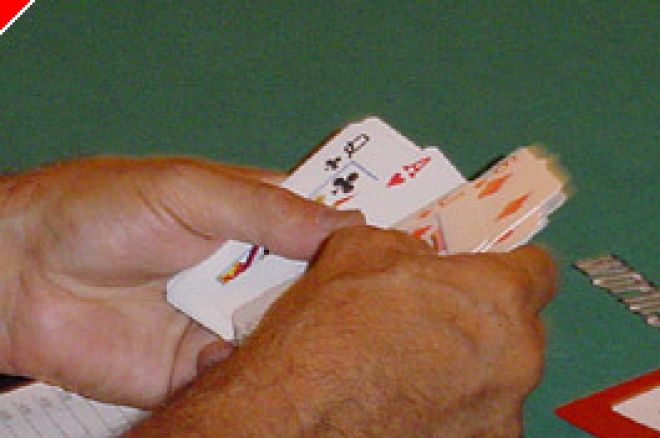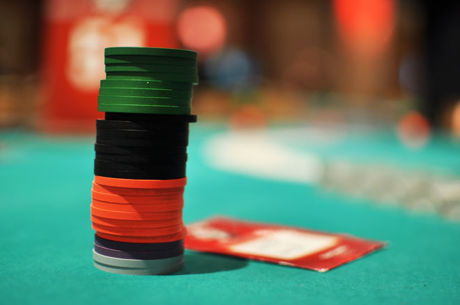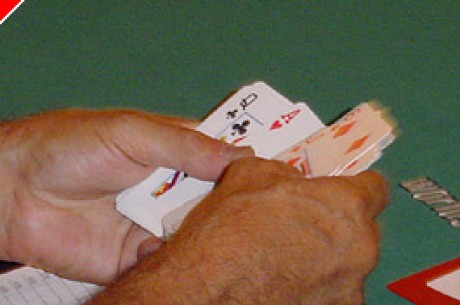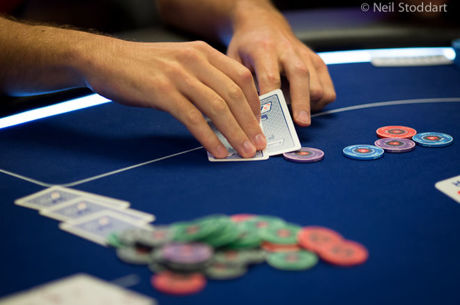Stud Poker Strategy - Seduced by your own Hype

I love old movies. Good thing too, because I don't have cable. And sometimes that's all that's on late at night when I can't sleep.
There was one the other night. I don't remember the name. It wasn't famous I don't think. I had never heard of it nor seen it. The plot was pretty silly. A guy tries to make a bundle of money at the race track by convincing everyone else to bet on a horse with no shot so that he'll get a good price on the favorite that cannot lose.
So here's what he does. He and a confederate start toting this nag - this longshot that can't win - "Brubaker" was his name. The horse is running in the Fourth race and they start their promoting in the First. "Go for Brubaker" one of them says to a stranger as he looks at his racing form. "Brubaker in the Fourth - can't lose. I have it on good authority." Or they stand in a crowd of horsemen and conspicuously circle the horses name on the program with many exclamations. "Can you believe this horse? This Brubaker is a sure winner in the Fourth - a SURE thing!"
And so goes the campaign to pump up the prize on the favorite. By the second race, other people have already started to take up the chant for Brubaker. And by the third race the chant has become almost hysterical - with people running through the racetrack talking to no one in particular about the attributes of this supposed wonderhorse who is still going off at a great prize.
By the end of the Third race there is a virtual stampede of bettors pushing and shoving toward the betting windows. Finally, our hero is, standing in a long line waiting to bet on the true quality horse in the race - who is now going off at 5-1 thanks to all of his shilling for the nag Brubaker - who has been bet to a 2:5 favorite. Hordes of bettors are shoving him forward all screaming and chanting BRUBAKER. In the midst of the frenzy our hero can't control himself and when he reaches the winner shouts $5,000 ALL ON BRUBAKER TO WIN!
For poker players this is a great lesson in hype. I think about it all the time when I'm trying to present an image to my opponents in a 7-Card Stud game.
In the higher stakes games, with antes a larger percentage of the bet, stealing those antes is a large part of the game. If you don't steal antes from time to time in this game then you'll eventually, though slowly, go broke.
So you look for opportunities to steal. You try a steal when you're the highest upcard or when it's folded to you in late position. And then, if you get a caller, and you catch a scare card, you sometimes continue to the steal attempt on Fourth Street if you catch a scare card or if it looks like your opponent's card didn't help him.
And then, for whatever reason, your opponent calls you on Fourth. But he still doesn't seem to be strong. And now it's the double bet round. And you don't want to give up on a bluff that just might work. Perhaps he was waiting for Fifth Street before he really took you seriously. So you bet the $40 on Fifth Street hoping he'll fold - since you have nothing really. Only for whatever reason, he ccalls you on Fifth Street as well.
Now it's Sixth Street. The pot has four large bets in it. You can't give up now. Sure, you're still bluffing, but you've known people to fold on Sixth Street. And you are getting 4:1 on your bet. So you make your wager.
But you're called. You can't seem to knock this guy out. And now it's the River? Well, you have to bet don't you, figuring that it's the only way to win the hand. And with all that money in the pot you have to at least take a stab at it. So you bet and, of course, you get called and you lose with your pathetic bluff.
What happened is that you fell victim to your own game plan. You wanted to be aggressive to convince your opponent to fold when you didn't really have a hand. But then, rather than recognize that your plan had failed, you were propelled by your own desire to win at all costs - failing to recognize that betting was no longer reasonable.
Here's another example - perhaps closer to the original story.
You're a tight/aggressive player - playing very selectively, waiting for high quality hands, and then betting them. You've noticed that you aren't getting called as much as you had in the past. Your opponents are either noticing or you are being especially tight lately. You decide that you'll mix up your game somewhat, betting more aggressively more of the time.
Your new style seems to work. You have (AhJh)Qc and you raise in late position when one player calls the bring in in front of you. Sure enough, everyone else folds. A couple of hands later, with (7h7d)Qs you raise in mid position when no one has called. Sure enough you win the antes. A few hands later, after calling the bring-in with (3c4c)Jc you hit and Ace, are high and bet and win the pot. This aggression is working.
So you expand your repertoire even more - convinced that you can pretty much win at will if you are aggressive enough (2hQs)Js? No problem. Raise and win. (Ac7d)Qs. Raise again. OK, you got a caller. Next card gives you (Ac7d)QsTs and your opponent has 9dKd. He checks. So you bet again. Another call. Now on Fifth Street you get (Ac7d)QsTs8d and your opponent gets 9dKdAh. He checks. Your aggression has paid off until now so you bet again. No dice. He calls.
The point is this. Aggression works. Loose and wild can work sometimes too. But you must be in control of it. You must learn to give up on your bluffs when they don't work and to maintain your ability to be selective even while you taking advantage of a fearsome image. Don't fall prey to your own strategy by being seduced completely away form the tight/aggressive style that had worked for you in the past.








